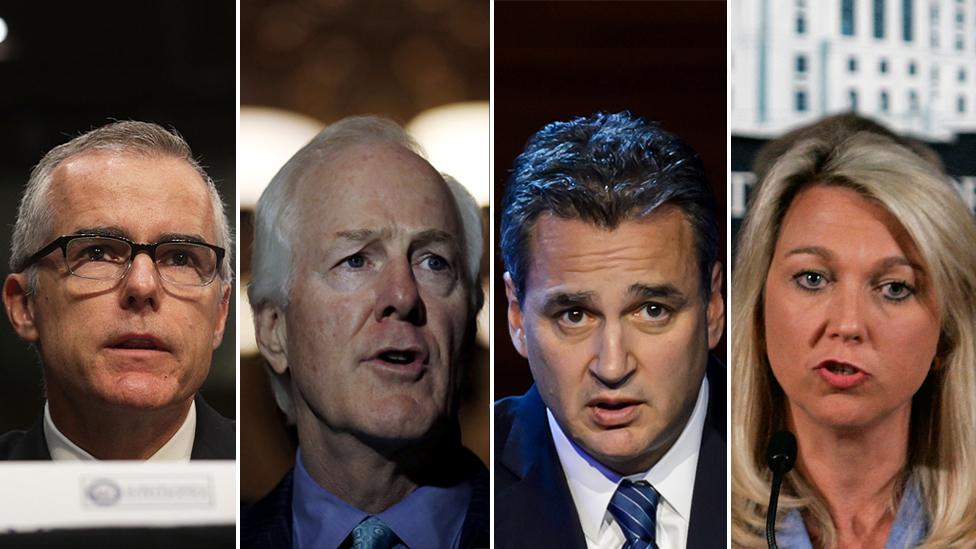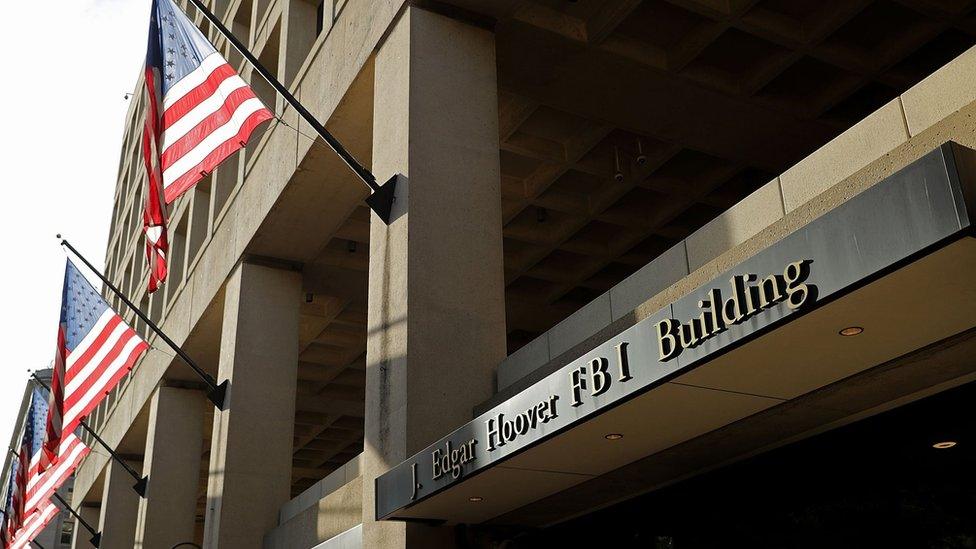FBI chief sacking: Comey replacement could be appointed 'next week'
- Published

From left to right: Acting FBI Director Andrew McCabe, Republican Senator John Cornyn, New York Appeals Court Judge Michael Garcia and lawyer Alice Fisher
US President Donald Trump says he could announce a replacement for fired FBI Director James Comey by late next week.
He told reporters it was "possible" he could name someone by Friday, before he leaves for his first foreign trip.
Defence lawyer Alice Fisher was the first candidate interviewed at the justice department, US media report.
Acting FBI Director Andrew McCabe, New York Appeals Court Judge Michael Garcia and Republican Senator John Cornyn also met Attorney General Jeff Sessions.
Eleven people are reportedly being considered for the position, which requires confirmation in the Senate.
President Trump has faced a backlash for sacking Mr Comey, who had been investigating alleged Russian meddling in the US election.
He told reporters travelling with him on Air Force One that he wanted to move quickly to find a new FBI director.
"I think the process is going to move quickly because almost all of them are very well-known, they've been vetted over their lifetime essentially," he said.
Fox News quoted a government source as saying they were moving "quickly and expeditiously" to find a replacement, adding: "We're doing our due diligence - we are not going to cut any corners."

The FBI is conducting an inquiry into alleged Russian meddling in the US election
Mr Cornyn, the Texas Senator, is the second highest-ranking member of the Senate and a former Texas Attorney General.
Mr McCabe was the FBI's deputy director until he stepped up after the abrupt departure of his boss. He appeared to contradict the White House this week when he described the inquiry into alleged Russian meddling in the US election as "a highly significant investigation".
He also cast doubt on White House claims that Mr Comey had lost the confidence of FBI staff.
Ms Fisher was an assistant attorney general for the justice department's criminal division. She currently works at a law firm.

Read more:

The other candidate widely named in the US press is New York Appeals Court Judge Michael Garcia, a former New York prosecutor.
Although reports initially said just those four candidates were on Saturday's interview list, the Associated Press now says that Adam Lee, the head of the FBI's office in Richmond, Virginia, turned up at the justice department as a candidate.
Meanwhile, President Trump is facing growing questions about whether he secretly recorded his conversations with Mr Comey after he appeared to tweet a thinly veiled threat to the former FBI director.
He said Mr Comey "better hope there are no tapes" of their conversations at a private White House dinner in January during which the president claims Mr Comey assured him he was not being investigated over alleged links to Russia.

In an interview with Fox News, Mr Trump said that he did not want to discuss the matter and that all he wanted was for Mr Comey to be honest.
He previously told NBC News that Mr Comey had requested the one-on-one dinner, but the former FBI director reportedly maintains it was the president who invited him.
Mr Comey had said he was "uneasy" before the dinner, according to former Director of National Intelligence James Clapper.
On Friday, the White House denied reports that President Trump had also asked Mr Comey to pledge loyalty to him, and that he responded he would offer the president honesty, but not loyalty.
Donald Trump addresses the reasons for the sacking in an NBC interview
Mr Trump travelled on Saturday to Virginia to speak at Liberty University, an evangelical Christian institution founded by the late conservative televangelist Jerry Falwell.
The US president enjoys an approval rating from white evangelical protestants that is nearly double his approval rating with the general public, according to the Pew Research Center.
He did not mention the controversy around Mr Comey in his speech to graduates, though he did exhort students to challenge the establishment and "relish the opportunity to be an outsider".
Echoes of Watergate
Mr Trump's behaviour in recent days regarding Mr Comey has provoked fresh comparisons between his administration and that of disgraced President Richard Nixon, who famously recorded conversations, speeding his downfall during the Watergate scandal.
Senior Democrats on the House judiciary and oversight committees wrote to the White House on Friday demanding copies of any recordings.
John Conyers and Elijah Cummings' letter noted "it is a crime to intimidate or threaten any potential witness with the intent to influence, delay or prevent their official testimony".

What do Trump supporters think about Comey's firing?